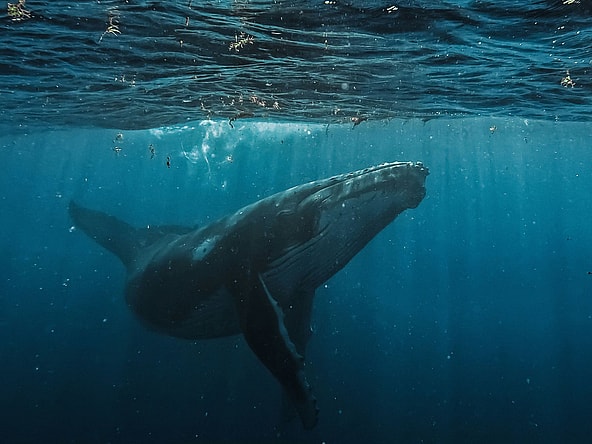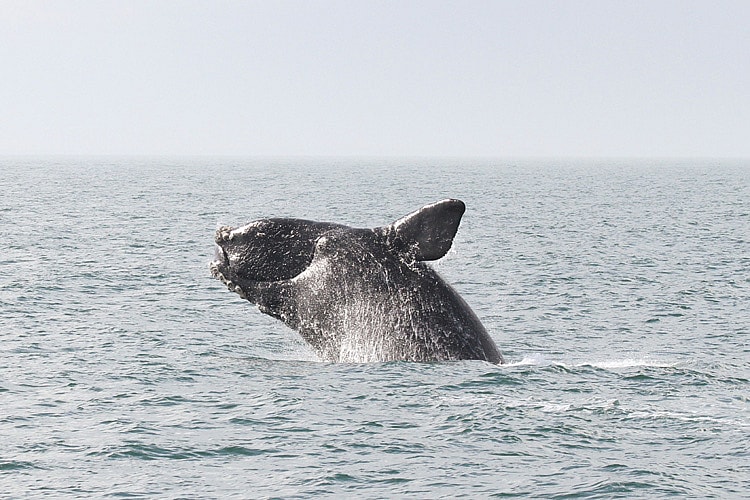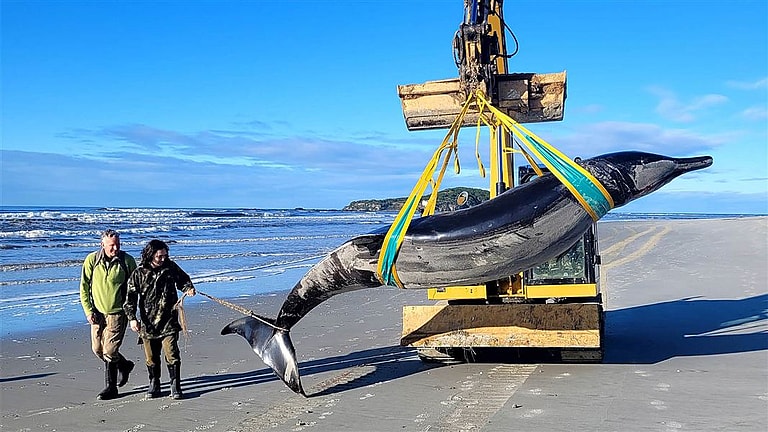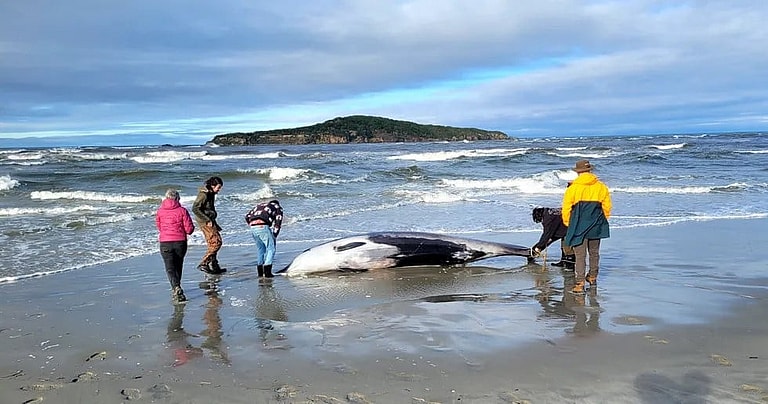
It’s not uncommon for the ocean to bring wildlife and mysteries on shore, especially in New Zealand. Last week, however, New Zealand caught a glimpse of the world’s rarest whale ever, an elusive marine mammal known as a Spade-Toothed Whale.
Over the years, New Zealand has become a hot spot for shored whales, especially in 2018 in an RNZ article showed over 50 pilot whales dead on the beach of the Chatham Islands. It’s quite common for stranded whales, and dolphins, to be found along their beaches. But what does it mean now that one of the world’s rarest whales has been spotted dead on their beach?
Related: Extinct Animals That Became Extinct in the Last Century
The World’s Rarest Whales

Whales are known for being some of the largest animals in the world, dominating the sea with their size and weight. But they’re also one of the loudest animals in the world, shrouding the waters with their songs and creaks.
There are several varieties of the whale, from the popular Sperm Whale to the biggest Antarctic Blue Whale. But what are the rarest whales in the world?
4. Western Gray Whale
Belonging to the baleen whale family, the Western Gray Whale is pretty large, ranging around 43 to 49 feet and weighing around 90,000 pounds. It’s estimated that there are only around 120 individuals alive, making them one of the most endangered species. Even with their dominating size, they still face several threats, such as habitat degradation, pollution, entanglement in fishing gear, and collision with ships.
3. North Pacific Right Whale
The North Pacific Right Whale is critically endangered as well with only 50 individuals alive. These majestic creatures live primarily in the vast expanse of the North Pacific Ocean and is one of the largest whale species on early, weighing around 180,000 pounds and ranging up to 60 feet. Due to threats of historical commercial whaling, climate change, and habitat degradation, their numbers have dwindled severely.
2. True’s Beaked Whale
The True’s Beaked Whales are in a smaller family, only growing around 17 feet long and weighing around 3,000 pounds. These species are found in deep, offshore waters of the North Atlantic Ocean, such as the Gulf Stream and the Bay of Biscay. They’re very rare, with an unknown amount of individuals, due to their deep sea habits.
1. The Spade-Toothed Whale
And of course, the Spade-Toothed Whale is the World’s rarest whale. There is very limited knowledge about the species as there are very few recorded sightings and few specimens that have been washed ashore. They have a robust body, slender beak, and a single pair of teeth towards the back of their mouth. They average 18 feet long and weigh around 5,000 pounds. Due to their deep sea and cryptic behaviors, they’ve made it very hard to observe and locate.
Check Out: Largest Animal in the World
Did the World’s Rarest Whale Wash Up in New Zealand?

On July 4th, 2024, a 16-foot-long Spade-Toothed Whale was found on New Zealand’s Otago region beach. The stealthy species was first identified in 1874 but is amazing at evading live sightings. Due to this, scientists know very little about them, like their habits, population, and more.
Until this moment, scientists have documented only six specimens. While it’s unfortunate that the stranded whale was beached on shore, this does give scientists a great opportunity to learn more about the marine mammal.
Scientists have never found a more intact specimen. This discovery allows them to dissect them for the first time and understand more about the elusive mammal. The DOC, or Department of Conservation, made a report reassuring that they will work with utmost respect for the creature, working with the local Indigenous people, Māori, partnering with Te Rūnanga ō Ōtākou to finalize the steps of the remains for the taoka (treasured possession in Māori culture).
Genetic samples have been sent to the University of Auckland as curators for the New Zealand Cetacean Tissue Archive. The DOC says that it may take several weeks or months for the DNA to be processed and the final species ID to be confirmed. But Mr. van Helden, a scientist who has been studying the species for 35 years, says he’s confident that it’s a spade-toothed whale based on its coloring and teeth placement.
If scientists are able to dissect whales, this could shed a whole new light on their biology and behaviors and how they differ from other beaked whales. Even the contents of its stomach could provide information on its diet and habits, identifying which parts of the ocean it lives in, helping it navigate and potentially find more of the whales in the future. The possibilities could help them understand the whales better substantially.
Read More: What Is the Loudest Animal in the World
Conclusion

The discovery was made early in the month, and while several conversations and procedures need to be in place before continuing, this discovery could turn the tide on what scientists understand about this elusive, rare species of whale.
The excitement around studying such an unknown whale is everywhere, and we can only hope that information starts coming our way. If you’re an animal enthusiast, keep checking in to hear more about this incredible discovery and what it could lead to for the future of the Spade-Toothed Whale.



